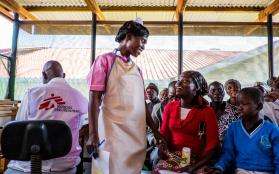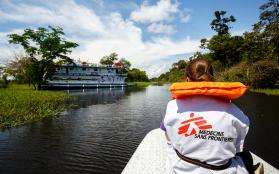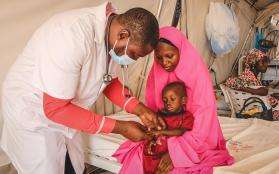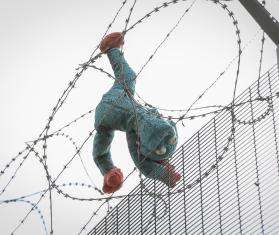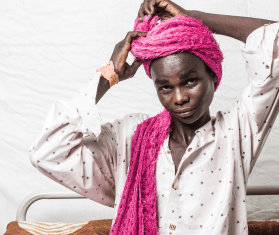681a.jpg)
Displacement and forced migration
People who have been uprooted from their homes often face further struggles on their journey to find safety, including a lack of access to essential needs like clean water, food, shelter, personal security, and health care. As they seek safety, many struggle to survive with what little savings or possessions they manage to bring with them, and become prime targets for violence, extortion, and human trafficking.
Doctors Without Borders/Médecins Sans Frontières (MSF) provides medical humanitarian care to displaced people at every step of their journey, from treacherous migration routes to the inhumane detention centers where many end up once they reach their destination. We also bear witness and speak out against harmful government policies that shut out vulnerable displaced people.
Who are displaced people?
Refugees are people who have fled war, violence, conflict, or persecution and have crossed an international border to find safety in another country.
Legal status/rights: Countries who are signatories to the Geneva Convention are obligated to take in refugees who arrive at their borders. They should not be expelled or sent back to their country of origin.
An internally displaced person (IDP) has been forced to flee their home but remains within the borders of their own country. Roughly half of the more than 134 million people displaced worldwide are IDPs.
Legal status/rights: IDPs are not eligible for protection under international refugee law or to receive many types of aid, since they remain within the jurisdiction of their own national government.
A migrant is a person who voluntarily leaves their home country in search of better working or living conditions.
Legal status/rights: Migrants are not eligible for protection under international refugee law or to receive many types of aid because their journeys are considered voluntary.
An asylum seeker is a person seeking safety and longer-term legal harbor in another country, applying for sanctuary (asylum) in hopes that the country will grant it.
Legal status/rights: Though national laws differ, countries are obligated to review asylum applications in due time—though “due time” is a very subjective measurement. Asylum seekers are often held in detention for many months until they hear any news about the status of their asylum claim.
A stateless person is someone who does not have the nationality of any country. Some people are born stateless, but others become stateless.
Legal status/rights: While international human rights law affirms that every person has the right to nationality, millions of people never acquire or are deprived of citizenship to a country. This can be because their state of nationality has ceased to exist, or because the territory upon which they live has come under control of another state. Without citizenship, stateless people have no legal protection or right to vote, and often lack access to education, employment, health care, registration of birth, marriage, and death, and the right to own property.
What causes people to be forcibly displaced?
There are many reasons people flee their home, including conflict, persecution, natural disaster, political repression, and lack of economic opportunity. Fleeing home represents a desperate necessity rather than a choice and comes with additional challenges along the way. MSF works to alleviate these challenges and the profound negative health impacts caused by forcible displacement.
Conflict is one of the major drivers of displacement around the world. At the risk of indiscriminate attacks as well as targeted violence, many civilians living through wars are faced with a wrenching choice: Try to survive under siege, or grab what they can and flee for their lives.
Natural disasters have the potential to displace hundreds, thousands, or even millions of people at a time. While some may seek shelter with family or friends, others are forced to wander indefinitely or settle in displacement camps that are often overcrowded and lack essential water, hygiene, and health care infrastructure.
In many places around the world, religious and ethnic minorities face systemic oppression by the government through discriminatory or exclusive laws and policies. They may also face targeted violence in their communities. In countries like Myanmar, for example, Rohingya Muslims have historically been denied citizenship by the country’s government and have been forced to flee successive waves of violence to neighboring Bangladesh.
Political instability is one of the most common drivers of violent conflict in the places where we work. In countries like Venezuela, political and economic turmoil makes living conditions untenable, driving families to leave their homes for a better life in another country.
people are forcibly displaced worldwide in 2023
of the 117.3 million forcibly displaced are children under the age of 18
people are internally displaced
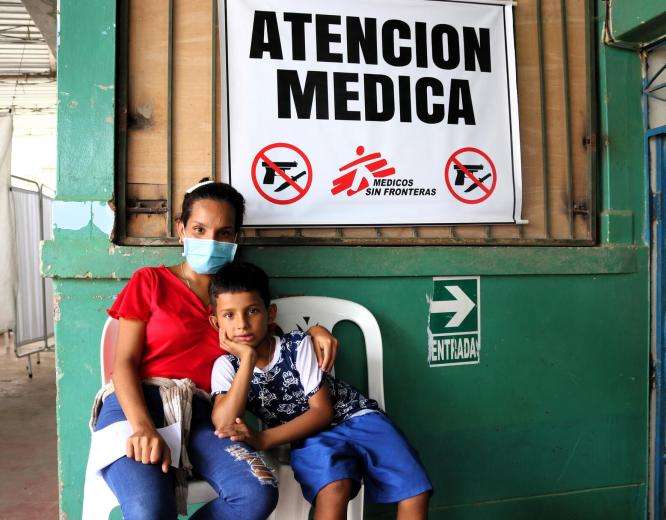
Inside one of the busiest migration points in South America
At a key border crossing in Peru, MSF teams witnessed firsthand the dire conditions and experiences that people face while seeking safety across borders.
How does MSF address the health impacts of displacement?
In our work, we pay special attention to the needs of people on the move to ensure they receive proper aid. As an independent and impartial medical humanitarian organization, MSF is committed to bearing witness to the experiences of the people we serve and speaking up to hold bad actors accountable on a global scale.
From the moment people are displaced to the moment they reach their destination—if they ever do—access to essential medical care and services can be tenuous at best. This is especially troublesome for people who are pregnant or living with chronic health conditions that require regular care.
How we help: MSF deploys mobile health clinics to displacement camps and key points along established migration routes to ensure medical and psychological care for people on the move. We also have established permanent reception centers in places where displaced people are known to settle along their journey, which can provide more comprehensive medical and social services.
Displaced people are particularly susceptible to violence in a variety of forms. Women and LGBTQI+ people, in particular, can experience sexual and gender-based violence. Refugees and migrants face a heightened risk of kidnapping and extortion while on the move, and when they arrive at their permanent or temporary destinations, they can experience violence from border authorities, arbitrary detention, and persecution in the form of harsh deterrence policies by local governments.
How we help: Teams at our mobile clinics and health facilities treat traumatic injuries sustained on the move. For patients experiencing an emergency that requires advanced medical attention, our staff provides the care necessary to stabilize the patient while arranging transportation to a local hospital or health facility.
Without regular access to health care and services, and especially in displacement camps that often lack adequate water, hygiene, and sanitation infrastructure, displaced people are at high risk of contracting and spreading communicable diseases like measles, malaria, and cholera. Diseases like these can compound and further exacerbate other urgent health threats like malnutrition, especially among children under five.
How we help: To head off disease outbreaks and facilitate conditions for long-term recovery, MSF bolsters the medical and psychological support of its mobile clinics by working with local authorities and organizations to build and rehabilitate local water and sanitation infrastructure. We also provide donations of relief items that contain toilet paper, soap, toothpaste, and other essentials.
The dire circumstances that force people to flee their homes, such as violent conflict, natural disasters, and systemic persecution, can leave deep emotional wounds that are exacerbated by the hardships experienced on the move.
How we help: In addition to providing medical care in our mobile clinics and reception centers, our staff are trained to provide psychological first aid to displaced people. We also provide comprehensive mental health care to those who are struggling to cope with the trauma they have endured while on the move. MSF mental health teams provide care using a variety of means depending on the context, from one-on-one counseling to group sessions, and art and animal therapy.
Help save lives. Donate now.
Help save lives in Gaza, Afghanistan, Sudan, and in 70+ countries.
How does MSF stay prepared to provide care at a moment’s notice?
Our financial independence enables us to freely evaluate medical needs, reach communities in need without restriction, and directly provide high-quality medical care. MSF USA is primarily funded by independent donors, which makes it possible for our teams to provide lifesaving aid to people on the move wherever they are.
More news and stories
Learn about MSF’s journalistic roots and our commitment to bear witness and speak out about the plight of the people we treat.
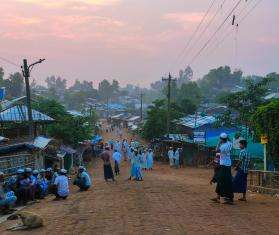
News Aug 09, 2024
Bangladesh: Spike in numbers of war-wounded Rohingya people arriving f...
Read More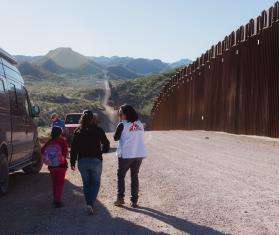
News Aug 08, 2024
MSF resumes support to local groups helping migrants in Arizona desert...
Read More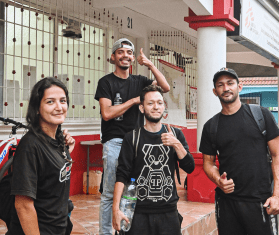
Story Jul 29, 2024
Migrants say Guatemala is one of the most difficult parts of the journ...
Read MoreLearn about MSF’s journalistic roots and our commitment to bear witness and speak out about the plight of the people we treat.
